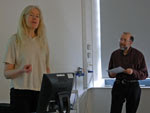 By JULIA DAY, STEPS Centre member
By JULIA DAY, STEPS Centre member
Read the presentation
Listen to a podcast of this seminar Introduced by Adrian Smith (40 mins)
Helena and Les’ presentation will be posted here soon
See photos from this seminar
We are excited to have Les Levidow of the Open University and Helena Paul of Econexus, London with us today. They are going to talk about one of the hottest and most controversial topics on the environmental, energy and agricultural agenda right now, biofuel crops. Their presentation is sub-title ‘integrating an agri-energy industry, driving dispossession’. Photo: Helena Paul and Les Levidow give their STEPS Centre seminar
Levidow kicks off the talk, outlining the situation. Biofuel crops have been increasingly promoted as a means to mitigate problems of climate change and energy insecurity in the common good. This would depend upon significant imports from the global South, where production of similar crops has already caused harm – e.g. higher land and food prices, greater agrichemical usage and community dispossession.
There are proposals to regulate imports through sustainability criteria, in order to avoid or minimise additional damage in the global South, but such proposals downplay the fundamental causes of conflict around biofuel crops. So critical research should investigate current strategies for promoting agri-energy-industrial integration, as well as the forces resisting the consequent dispossession.
So, on to doubts rasied about the EU policy; doubts about the harm in the south to crops used for biofeulds such as higher land and food prices and dispossesion from resouces; about the claims for mitigating climate change through reduced carbon emissions; about about how and whether the EU targets should be fulfilled.
Only yesterday, the European Commission has reinforced its support for the use of biofuels to fight climate change by backing an EU research platform.
But despite sharp disagreements over the potential harm, government is driving the use of biofuels forward.
Paul take over to talk about the questions for critical analysis. What are the causes for harm, she asks? Biofuel production is extending agri-industrial systems which have already harmed rural livelihoods and environments. The intensive monoculture of crops – such as soya in Argentina and palm oil in Indonesia – are reliant on agrichemicals and cause labour insecurity, and in Argentina, almost elimination of labour.
These systems displace people from the land and once they’re gone, it’s very diffiuclt to get them back, says Paul. She gives the example of jatropha production in Tanzania. Rising land prices also have many knock-on effects.
This tag-team style presentation swings into action and we’re back to Levidow to talk about the drivers of global industrial integration. Regulatory protection for local populations and environments are being undermined by global competitive corporate pressure that seeks standard products for a globalised commodity exchange. Thus global biofuels production depends upon and stimualtes the vertical and horizontal integration of the agri-feed-fuel industry.
The result is a recent shift towards a global integrated biofuel network (GIBN), hich has greater transboundary flows, homogenisation of products and processes and greater integration with fossil fuels. At this point Levidow introduces the concept of ‘new enclosures’, drawing on the traditional idea of common land that the community sustained. He says the idea of ‘new enclosures’ can help analyse how neoliberal regimes appropriate commons, and how resources are enclosed by pollution, private ownership, capitalizing nature etc.
And over to Paul. She talks about GIBN as new enclosures, that the global biofuel production is dispossessing people. Land is used for production of feed or fuel for other regions and small scale producers are sucked into large scale plantations.
And what is sustainability for biofuel crops, asks Paul? For GIBN, sustainabiltity criteria focuses on perameters that can be measured and regulated, but these criteria are in no way central to the industrial and market pressures of this business.
Are GM crops a solution, as have been proposed as a means of sustainable biofuel production? Pro-GM solutions assume that potential harm arises from inefficiency, but levels of efficiency is not necessarily the way to to look at this issue. The hope that GM crops can help avoid responsibiity for the harmful effects on societies while pre-empting alternative futures. Its sets us down a particualr path, she says, echoing the STEPS Centre’s focus on ‘pathways’ – how decision-making processses leave some patwhays open and some blocked.
An finally, some of the things Paul and Levidow think would be useful – strategies for integrating a global agri-feed-fuel industry; socio-poliitcal forces attempting to resist enclosures; contending accunts of sustainability and efficiency; optimistic asumptions of government policies and efforts by state and expert bodies to mediate societal conflicts. But, asks Paul, should we be instigating these societal conflicts in the first place?
Paul concludes: “Why should it only be this one path? We really need to look at the targets, the targets are set, industry is racing ahead and we have people running behind saying ‘let’s look at sustainability’. But it’s too little, too late.”